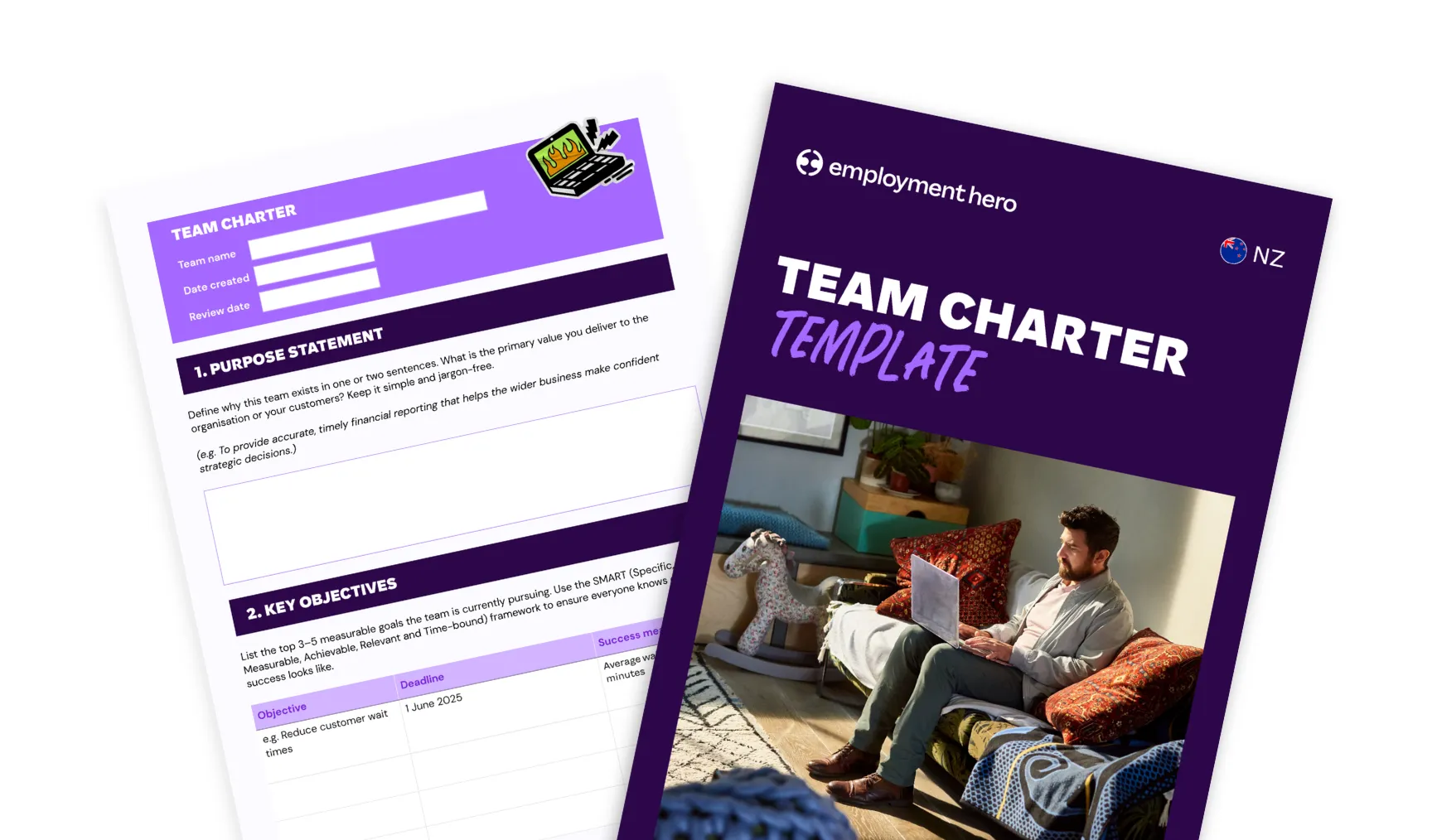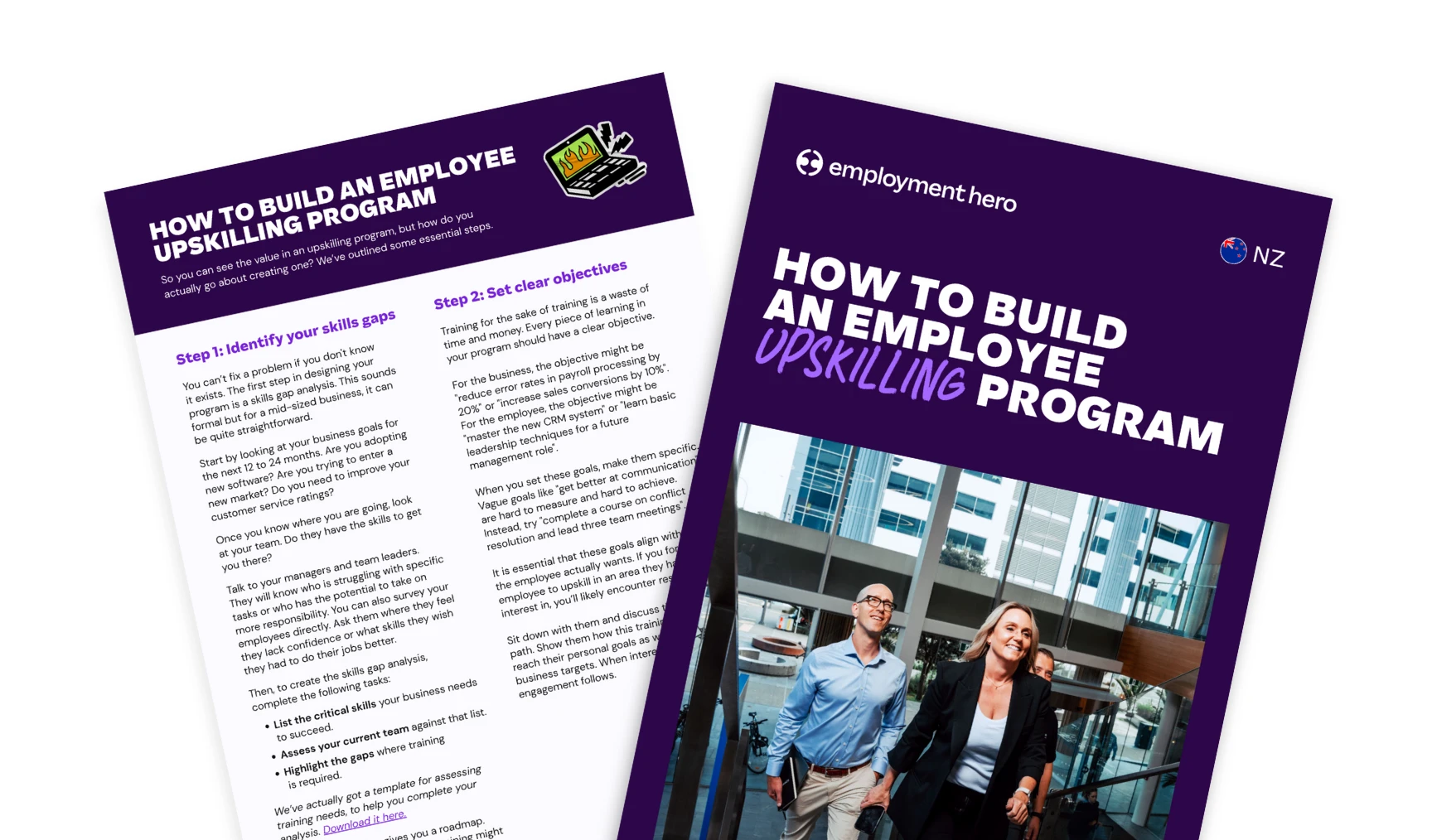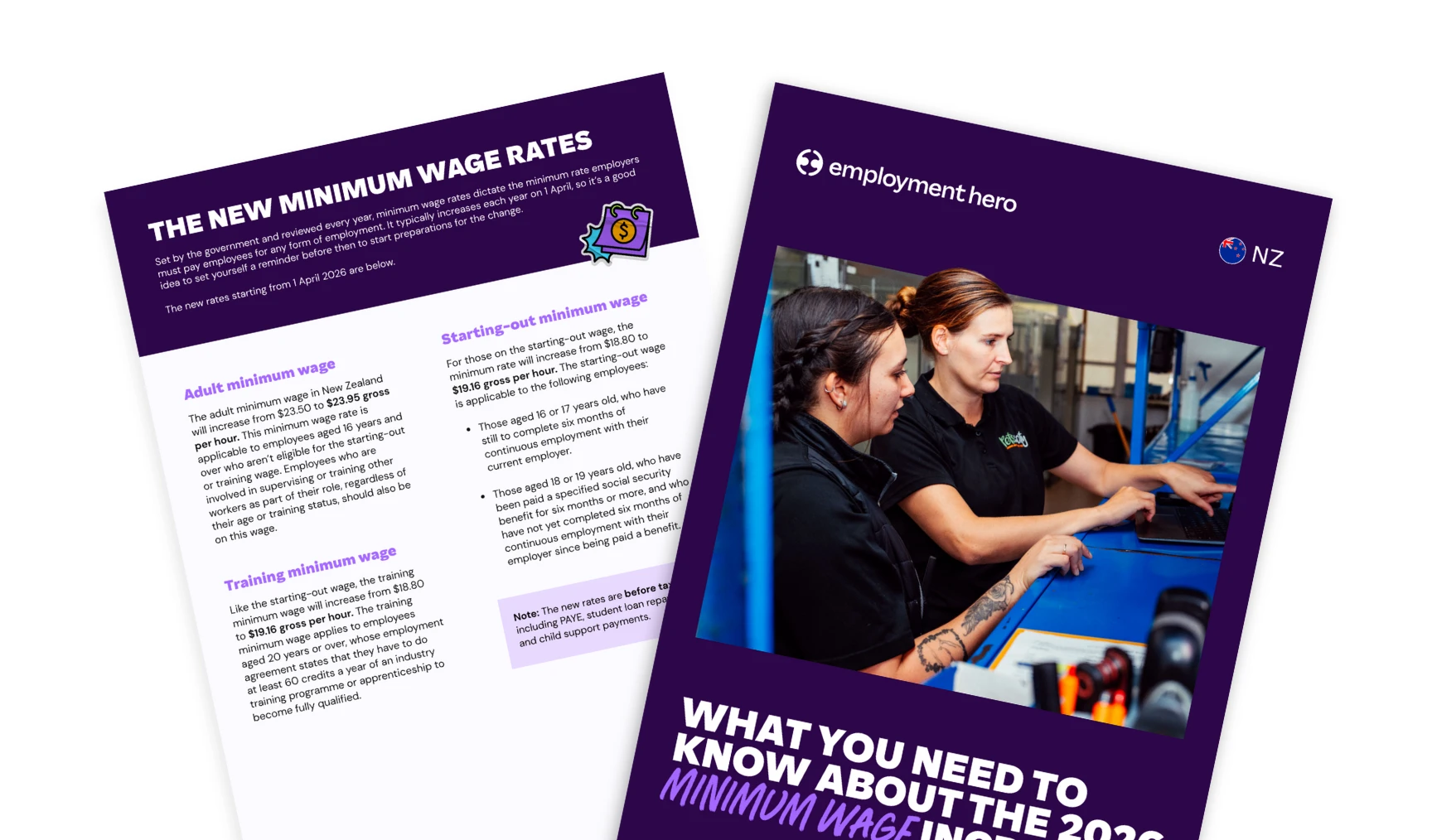Return To Work Meeting Interview Guide (+Free Template)
Published
Return To Work Meeting Interview Guide (+Free Template)
Published
2 min read
Return to work meetings are a great way to ease staff back into work after a period of absence. While not mandatory, they provide a structured process that can help the employee feel supported while transitioning back into their old routine.
It can also be a way to track staff absences, detect patterns of absence, and to uncover any potential issues in the workplace which are contributing to absences – addressing these can help you boost your employee relations. And, hint hint, managing staff absences and addressing any emerging issues in the workplace can also give your employee value proposition a boost too.
What is in this Return to Work Meeting Template?
This template covers two bases. The first is a form for the employee to complete when they return to work. The second is a form that can be filled out as part of the employee’s return to work interview.
You can keep these forms on file as part of your HR process.
A sneak peek of the return to work meeting template
This template covers:
- What to note in relation to an employee’s absence record
- How to record reasons for absence
- How to structure a return to work plan
The information in this article is current as at 20 April 2023, and has been prepared by Employment Hero Pty Ltd (ABN 11 160 047 709) and its related bodies corporate (Employment Hero). The views expressed in this article are general information only, are provided in good faith to assist employers and their employees, and should not be relied on as professional advice. The Information is based on data supplied by third parties. While such data is believed to be accurate, it has not been independently verified and no warranties are given that it is complete, accurate, up to date or fit for the purpose for which it is required. Employment Hero does not accept responsibility for any inaccuracy in such data and is not liable for any loss or damages arising either directly or indirectly as a result of reliance on, use of or inability to use any information provided in this article.You should undertake your own research and to seek professional advice before making any decisions or relying on the information in this article.
What are ‘return to work’ meetings?
‘Return to work’ meetings are good practice for employers to ensure that employees who have been absent from work due to illness or injury feel supported and valued, and to help them return to work successfully.
‘Return to work’ meetings are held between an employer and an employee after the employee has been absent from work, typically due to illness or injury, to discuss the employee’s return to work. These meetings can help to ensure that the employee’s return to work is as smooth as possible and that any issues that may affect the employee’s ability to work are addressed.
These meetings serve a number of purposes:
1. Welcome the employee back to work
The meeting is an opportunity for you as an employer to welcome your employee back to work and to show support for the employee’s return.
2. Discuss the reason for the absence
In a return to work meeting, you may ask the employee to explain the reason for their absence to help them understand the employee’s situation better and identify any issues that may have contributed to the absence.
3. Review any necessary paperwork
The meeting is also an opportunity to review any necessary paperwork, such as a doctor’s note or a return to work plan.
4. Address any concerns or adjustments
Once you understand the reasons for your employee’s absence, you can use the return to work meeting to address any concerns that the employee may have. You may also choose to discuss any reasonable adjustments that may be needed to help the employee return to work successfully, such as a reduced workload or flexible hours.
5. Set expectations
Finally, this is the appropriate setting in which you can set out expectations for your employee’s return to work, including performance expectations, work hours, and any ongoing support that you can provide.
Who should attend return to work interviews?
The attendees of a return to work interview will depend on each company’s policies and procedures. However, the following people are usually present in a return-to-work interview:
The employee
The employee who has been absent from work due to illness or injury is the most crucial person who attends the return to work interview. The meeting is an opportunity for the employee to discuss their absence and return to work.
The employee’s line manager or supervisor
The employee’s line manager or supervisor should attend the meeting to discuss any work-related issues that may have contributed to the employee’s absence and to help plan the way ahead.
A HR representative
Where possible, a HR representative should attend the meeting to ensure that the company’s policies and procedures are followed and to provide support to both the employee and line manager or supervisor.
Occupational health provider or medical professional
Depending on the nature and duration of the employee’s absence, an occupational health provider or a medical professional may be present in the meeting to provide additional medical information and help plan the employee’s return to work.
What are some reasons for prolonged absence from work?
The workforce is the driving force of any company, and a happy, healthy workforce means a happy, healthy and successful company. Absences can happen for any number of reasons, but it’s important for a business to keep an eye on staff absences, especially prolonged absences, because it’s a warning sign of absenteeism – the practice of regularly missing work without good reason.
When it comes to prolonged absence from work, there are some common reasons:
- Illness or injury
- Acute medical conditions
- Mental health issues such as stress, anxiety or depression
- Bereavement
- Family reasons, such as caring for a child or an elderly or sick relative
Of these, stress often tops the list. In 2021 in the UK, 57% of organisations reported that one of the most common reasons for long term absences was for mental health issues.
In any event, it’s essential to treat each case of prolonged absence from work with sensitivity and empathy. Employers should follow their company’s policies and procedures for managing absence, which may include offering support to the employee, monitoring the absence, and planning the employee’s return to work. This can all help your employee feel heard and feel valued.
Download the return to work interview meeting template now.
How to run an effective return to work interview
When an employee returns to work, it’s a good idea to schedule a return to work interview. This is where our handy template comes in.
And if you’re wondering how to approach it, here are our top tips for running an effective return to work interview:
1. Preparation is key
Determine who will attend the interview, and prepare and circulate an agenda. Review the employee’s attendance records, job description, and any relevant medical information before the meeting. This preparation will help you understand the reason for the employee’s absence and facilitate a more productive discussion.
2. Create a supportive environment
The meeting should be conducted in a private and supportive environment. It’s important to set the tone that allows the employee to feel comfortable and confident to share their experience. Open the meeting by welcoming the employee and introducing the attendees and the purpose of the meeting.
3. Start with an open-ended question
Start the interview with an open-ended question to allow the employee to share their experience. For example, “Can you tell me how you are feeling about returning to work?” This will help to understand the employee’s perspective.
4. Listen actively
Active listening is essential during the interview. Listen carefully to the employee’s responses, including non-verbal cues, and show empathy and understanding. Don’t interrupt, but don’t be afraid to take notes and ask any questions you need to clarify and make sure you understand what your employee is telling you.
5. Identify any work-related issues
Identify any work-related issues that may have contributed to the employee’s absence. For example, workload, stress, or relationship issues. This will help to address any underlying problems and prevent further absence.
6. Discuss support
Discuss the support available to the employee, such as employee assistance programmes (EAP), counselling services, occupational health services, or further training. Depending on the reasons for absence, you might also want to consider how you can improve your employee experience, sharing any relevant resources with your employee and wider team.
7. Agree on a return-to-work plan
Agree on a return to work plan that outlines the employee’s duties, responsibilities, and work schedule, taking into account the employee’s needs and medical advice. It may be appropriate to discuss performance evaluations, and to set goals and objectives. Importantly, the plan should include any necessary accommodations or reasonable adjustments to support the employee’s return to work. Explain that the plan is a working document, and that it should be flexible and reviewed regularly.
8. Follow up
Follow up with the employee regularly to ensure they are coping well and to make any necessary adjustments to the return to work plan. One to one meetings are a great way to keep in contact with your employee. Whatever cadence you decide to follow, make sure you set a date to follow up on any action items and to review the return to work plan.
Examples of return to work interview questions
Need some more guidance on what to say to your employee? Here are some examples of return-to-work interview questions that can be used to guide the discussion with your employee:
- Can you tell me more about your absence and what led to it?
- How are you feeling now? Have you fully recovered or are there any ongoing health issues we should be aware of?
- Are there any adjustments or accommodations that we can make to support your return to work?
- How did you find the process of reporting your absence and staying in touch with the company during your time away?
- Were there any work-related issues that contributed to your absence? If so, how can we address them to prevent future absences?
- Do you have any concerns or questions about returning to work?
- What do you feel would be the best way for us to support you in your return to work?
- Is there anything else you would like to discuss or any feedback you would like to provide?
Just remember to tailor the questions to the specific circumstances of the employee and their absence.
What if an employee refuses to attend a return to work interview?
If an employee refuses to attend a return-to-work interview, it’s important to understand the reasons for their reluctance and try to address any concerns they may have. The first step is to remind the employee of their obligation to attend the meeting and the importance of the meeting in ensuring a successful return to work.
Some employees may be uncomfortable discussing personal health issues or may be concerned about disclosing sensitive information. In these cases, it may be helpful to reassure the employee that the meeting will be conducted in a confidential and supportive manner, and that any information shared will be used solely for the purpose of supporting their return to work.
If the employee is refusing to attend the meeting for more substantive reasons, such as a dispute with their manager or dissatisfaction with the company’s policies, it may be necessary to address these concerns separately. It may be helpful to involve a neutral third party, such as an HR representative or a mediator, to help facilitate the discussion and find a mutually acceptable resolution.
Ultimately, if an employee continues to refuse to attend the return to work interview without a valid reason, you may need to take further action in accordance with your disciplinary policies and procedures. However, this should be seen as a last resort, and every effort should be made to address the employee’s concerns and ensure a successful return to work.
Download the return to work interview meeting template now
Managing absences smoothly goes a long way to cultivating a strong, positive company culture, engaging employees and reducing turnover.
From return to work interviews to regular touch points, make use of the tools available to you to help your team communicate openly and collaborate seamlessly. Learn more about how we can help with employee engagement strategies by booking a demo with our business specialist today.
Register for the Template.
Related Resources
-
 Read more: How to create a team charter: Template and guide
Read more: How to create a team charter: Template and guideHow to create a team charter: Template and guide
Create high-performing teams effortlessly with our essential team charter template. Discover practical steps and tips to enhance collaboration.
-
 Read more: Building an employee upskilling program: Training program template
Read more: Building an employee upskilling program: Training program templateBuilding an employee upskilling program: Training program template
Learn how to design a successful employee upskilling program in NZ. Build skills, boost retention, and future-proof your workforce with…
-
 Read more: What you need to know about the 2026 minimum wage increase
Read more: What you need to know about the 2026 minimum wage increaseWhat you need to know about the 2026 minimum wage increase
The minimum wage rate increase on 1 April 2026 applies to many Kiwi employers. We’ve compiled all the information you…





















